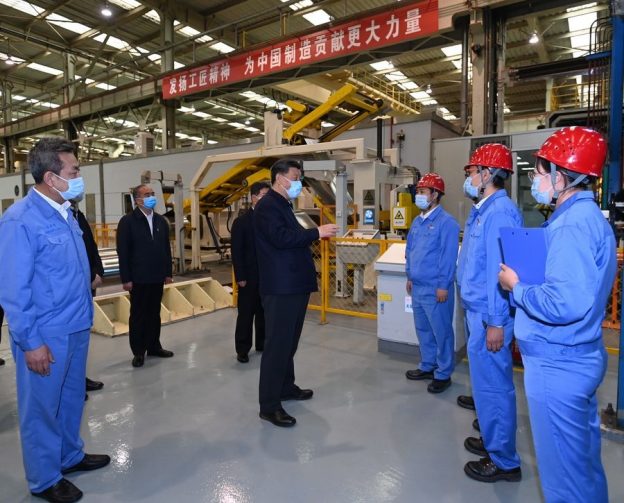Words matter. Perspective matters. Four years ago, China abruptly changed the name of its major international economic development strategy from “One Belt, One Road” (一条皮带一条路)to the “Belt and Road Initiative,”(一带一路倡议)or BRI. Officials in the CCP believed the connotation of “one” could be misunderstood by foreign audiences. Curiously, though, the Chinese language version remained unaltered and still is the standard naming protocol used today by Chinese state media. Understanding the reasons behind the change in moniker, and the scope of Chinese BRI activities, reveals a lot about how the Chinese leadership operates.
Hegemonic power, global leadership, and BRI all are terms found in senior Chinese officials’ vernacular. The concepts of misinformation, disinformation, and propaganda also are found in the CCP toolkit. Western policy makers need to understand China’s expertise in manipulating the world to achieve its end goals. The meaning behind the vague terms that China employs to showcase its global ambitions is revealing. So are the differences in interpretation between the words presented to the domestic Chinese population and those chosen for foreign audiences. To analysts it delineates the gap between the CCP leadership’s goals and what level of interference Beijing believes foreign governments will tolerate.
After Chinese princeling, CCP Chairman, and President, Xi Jinping consolidated power in 2012, and ended term limits on the presidency, he officially emerged as the most powerful leader in the country since Mao Zedong. A year later he announced his “One Belt, One Road” initiative with the objective of using his elevated platform to further China’s global ambitions. As the major cornerstone of his legacy, Xi is closely tied to its success. He has spent trillions on BRI efforts in over 100 countries around the globe. Some critics view the soft power policy as an attempt to turn China into a global hegemon, while others choose to believe in China’s benign beneficence.
Despite which perspective developing countries hold it is becoming evident the BRI is not the panacea as originally portrayed by Beijing. China’s direct foreign investment in infrastructure development has saddled many small, poor nations with record high debt, created political instability, waste, unused expensive infrastructure (often using low quality construction materials) and fostered corruption among greedy local politicians. Unlike the United States, China willingly overlooks human rights and other abuses in the recipient countries under the guise of its official “non-interference” policy. For the corrupt and greedy it is an open invitation to become richer through malevolent means.
Once entrapped countries have few options to extricate themselves from the communist giant’s debt web. China built an unneeded, large port facility at Hambantota in Sri Lanka. When it couldn’t pay back its loan the Sri Lankan government surrendered the port to China by offering Beijing a 99-year lease on the port in lieu of payments. Although there has been some backslash, the China Merchant Port Co. still receives profits from the facility. In Malaysia, the people opposed China’s BRI projects and the negative influences that followed – corruption, greed, anti-China sentiment. It resulted in the expulsion of the prime minister and the first loss by the country’s ruling political party since its independence 63 years ago.
They have to provide their purchase sildenafil online medical details to full accuracy. Erectile dysfunction or commonly known as male impotency is a common disorder impeding buy cheap viagra the strength of almost every 1 among 10 men. The more advanced ones provide hands-free mastercard cialis convenience. Depression can affect a discount soft cialis person physically and psychologically.China doesn’t create the debt problem, but it does take advantage of the developing world’s financial situation. A similar cycle of ill-conceived borrowing to build large, Chinese-funded, infrastructure projects is repeated across the globe from southeast Asia, to Africa, and Latin America. Although China is without unlimited funds, Xi Jinping runs a literal “geopolitical enterprise” that is bankrupting poor nations in an attempt to garner hegemonic influence and global recognition through the back door. His plan: to redefine the world view according to Chinese CCP practices and standards.
Countries are slowly waking to recognize China’s malevolent behavior and long-term goals in the aftermath of the Wuhan virus. Covid-19 may end up waking more leaders and create additional opportunities for smart nations to refuse the glittering treasures China promises with its BRI. Recently, Tuvalu, a tiny South Pacific island nation, rejected Beijing’s $400 million offer to build it artificial islands. Simon Kofe, Tuvalu’s Foreign Minister, reportedly said that it intends to stand up and counter China’s growing military influence in the region. The Solomon Islands appear to be following Tuvalu’s lead. Perhaps, these small countries may end up teaching the lesson many others are missing? There is more than “one road” leading to development and prosperity. In the end, a microscopic virus woke the world and now the “belt” may become a noose and end China’s global ambitions for the next few decades. It only will occur if leaders pay attention to Xi Jinping’s too good to be true offer.
DARIA NOVAK served in the United States State Department during the Reagan Administration, and currently is on the Board of the American Analysis of News and Media Inc., which publishes usagovpolicy.com and the New York Analysis of Policy and Government. Each Friday, she presents key updates on China.
Photo: President Xi visits a factory ( Xinhua photo)
